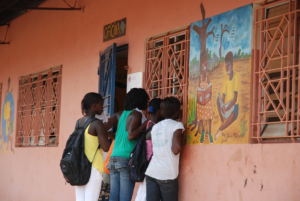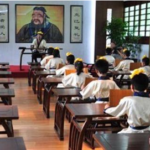Rui da Silva, Researcher, Center for African Studies of the University of Porto, Portugal.
Joana Oliveira, Associate professor, College of Education, Polytechnic Institute of Viana do Castelo, Portugal.

Image: Rui da Silva, 2009. Personal collection.
The article “Privatization of education in 24 African fragile and conflict-affected states: trends, common points and outliers”, published in the journal Educação & Sociedade (vol. 41), analyse and reflect on the main trends in the privatisation of education in 24 African countries considered fragile and affected by conflict. The countries under analysis have the financial support of Global Partnership for Education (GEP). The GPE is a multi-stakeholder partnership, created in 2002 by the World Bank under the name Education for All Fast Track Initiative. Today, GPE brings together 70 countries from the Global South and more than 20 donors. It is considered the only multilateral partnership and the only fund dedicated to ensuring that all children and young people in the Global South have access to quality education with a focus on the poorest and most vulnerable. It is worth noting that more than 60% of the GPE funding is for countries that are considered fragile or affected by conflict. The GPE support involves meeting several requirements, including the development of an education sector plan.
The study aims to provide a better understanding of international power relations in the field of education privatization. The article starts from a broad theoretical framework to frame the GPE and the role of this fund in the global educational policy arena. This article is based on content analysis of the Education Sectorial Plan or the transitional documents submitted by the following 24 African to request financial support to the GPE: Burundi; Cameroon; Chad; Comoros; Côte d’Ivoire; Eritrea; Gambia; Guinea-Bissau; Liberia; Mali; Mozambique; Niger; Nigeria; Kenya; Central African Republic; Democratic Republic of the Congo; Rwanda; Somalia; Sudan; South Sudan; Togo; Uganda and Zimbabwe
The article adapted Silva, Santos and Pacheco (2015) five main categories that refer to the privatization of education: 1 Valorisation of the private sector; 2 encouraging the use of the private sector; 3 right to choice; 4 evocation of education as a public service with private management; 5 Is advocated to decrease the interference of the state.
The results indicate that the education privatization by design prevails in the different countries. In the documents when is mentioned private management usually means by the community/ parents.
The Education Sector Plans of Côte d’Ivoire, the Central African Republic, the Republic of Congo, Somalia and Kenya are outliers. This stems from the fact that the documents do not follow the trends observed in the literature regarding education privatization (e.g., reduction of the private sector). In these strategic documents, the global-national connection is made very explicit, making it possible to increase knowledge about these relations in Africa from a critical perspective. It also enables other voices to be involved in questioning the real effectiveness of these partnerships and their ideologies in promoting education as a human right. The text is panoramic, to leave the way open for new research to deepen each of the aspects addressed.
Watch Rui’s video below presenting other perspectives of this study.
References
SILVA, R.; SANTOS, J. G. and PACHECO, J. A. Crossed looks: globalisations and curriculum in Guinea-Bissau. Compare: A Journal of Comparative and International Education, [online], 2015, vol. 45, no. 6, pp. 978-999, e-ISSN: 1469-3623 [viewed 28 September 2020]. https://doi.org/10.1080/03057925.2015.1013018. Available from: https://www.tandfonline.com/doi/abs/10.1080/03057925.2015.1013018? journalCode=ccom20
SILVA, R. O papel da parceria global para a educação na promoção dos referentes da globalização nos planos setoriais da educação dos PALOP. Revista on-line de Política e Gestão Educacional [online]. 2018, vol. 22, no. esp. 3, pp. 1258-1275, ISSN: 1519-9029 [viewed 28 September 2020]. https://doi.org/10.22633/rpge.v22iesp3.12010. Available from: https://periodicos.fclar.unesp.br/rpge/article/view/12010/7912
To read the article, access
SILVA, R. da and OLIVEIRA, J. Privatização da educação em 24 países africanos: tendências, pontos comuns e atípicos. Educ. Soc. [online]. 2020, vol. 41, e238622. ISSN: 1678-4626 [viewed 19 October 2020]. https://doi.org/10.1590/es.238622. Available from: http://ref.scielo.org/r478th
External links
Academia.edu: https://unicamp.academia.edu/EducaçãoeSociedade
Educação & Sociedade – ES: www.scielo.br/es
Facebook: https://www.facebook.com/ES.cedes/
LinkedIn: www.linkedin.com/in/educação-e-sociedade
Mendeley: https://www.mendeley.com/profiles/educao-e-sociedade/
Twitter: https://twitter.com/ES_cedes
Como citar este post [ISO 690/2010]:

















Recent Comments